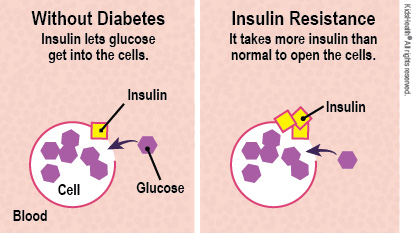Insulin Resistance: Caring for Your Child
Insulin resistance is when the cells of the body don't respond well to the hormone insulin. Insulin works like a key to "open" cells so glucose can enter them. When a person has insulin resistance, the body has to make more insulin to help glucose get into the cells. Glucose (sugar), the main source of energy that keeps our cells working, comes from food.
Insulin resistance can raise a child's risk of developing type 2 diabetes and other health problems. Getting to and maintaining a healthy weight, eating a balanced diet, and exercising regularly can help improve the body's response to insulin.


-
If your child is overweight, follow the weight loss plan prescribed by your health care professional.
-
Limit the amount of fast foods and sugary treats in your child's diet.
-
Encourage your child to drink water instead of soda, juice, or sugary drinks.
-
Serve healthy foods like whole grains, vegetables, fruits, lean meats, fish, beans, nuts, and low-fat dairy products.
-
Your child should be physically active at least 60 minutes each day.
-
Give your child any prescribed medicines as directed by your health care provider.

Your child:

Who gets insulin resistance? Insulin resistance is most often seen in kids who are overweight. Less commonly, it can happen in kids with some genetic syndromes or conditions that affect hormone levels, or in kids who take some types of medicines.
What health problems are related to insulin resistance? Kids with insulin resistance are more likely to develop other health problems, including high blood pressure; high triglycerides and low HDL ("good") cholesterol; and, in girls, polycystic ovarian syndrome (which can cause excess hair growth, irregular periods, and fertility problems). Many kids with insulin resistance have a skin condition called acanthosis nigricans, in which the skin in the folds of the neck, underarms, elbows, and knees becomes darker and thickened.
Will my child with insulin resistance get diabetes? Some kids with insulin resistance might go on to develop type 2 diabetes. This happens when the body is unable to make enough extra insulin to get glucose into the cells, so blood sugar levels (also called blood glucose levels) become high. Reaching and keeping a healthy weight with diet and regular exercise can reduce the risk.